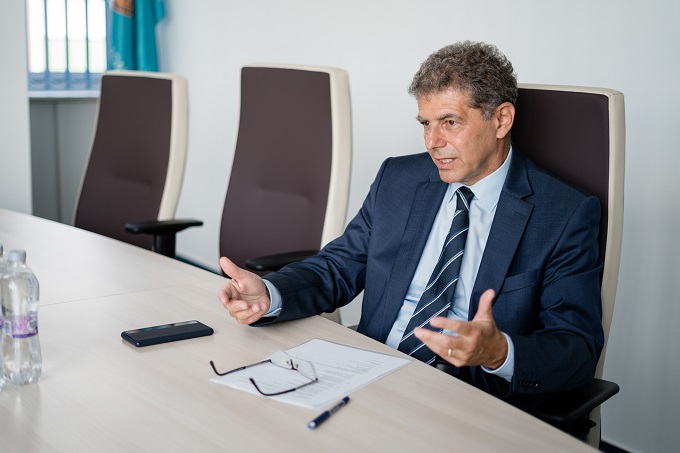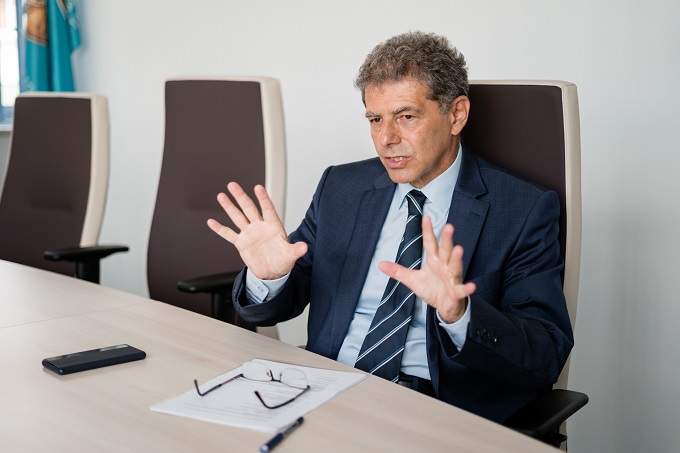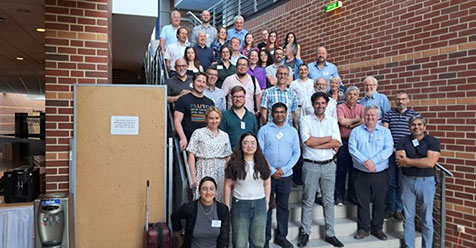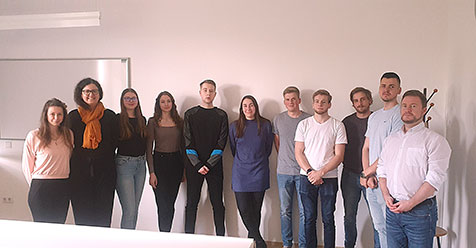Competitive GTK Education and Research in an Engineering and Natural Science Environment
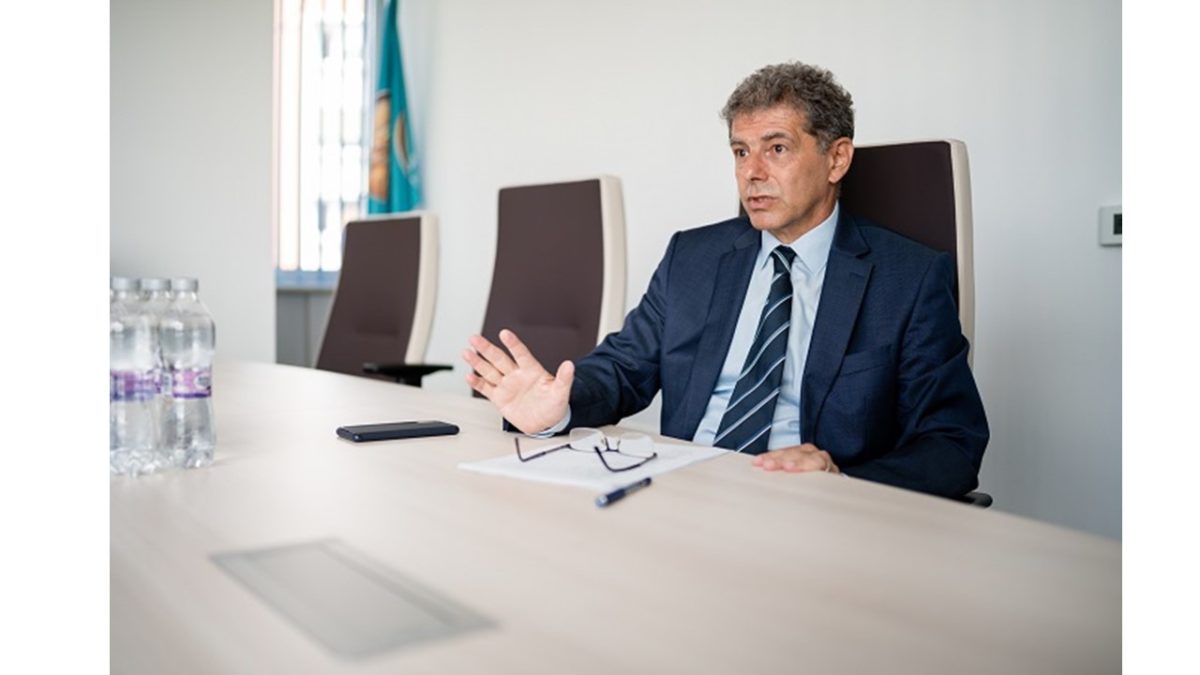
In July 2021, Tamás Koltai, Head of the Faculty of Economics and Social Sciences at the Budapest University of Technology and Economics (BME), started his second term as Dean.
In 2017, Tamás Koltai took over as Dean of the BME Faculty of Economics and Social Sciences (GTK) in a difficult situation. The previous leadership of the faculty had followed a path that was not compatible with the university’s strategy, and as a result a change of leadership took place at the faculty.
Dean Koltai, what happened after your first appointment? How was the situation stabilised at that time?
It is no longer worth going into the details of past events, but rather to draw the lessons that have shaped the direction of the faculty’s development over the past 4 years. The previous faculty management had set the student/lecturer ratio in an unfavourable direction by recruiting a large number of students. Such an increase in student numbers could not be absorbed by the teaching/research capacity without serious sacrifices. Internationalisation has taken a back seat, with no English-language courses having been launched in the faculty before. The teaching staff had to carry out a great deal of administrative work, the background to support teaching and research had not been built up, and the increased teaching and administrative burden was at the expense of academic work. Some of the faculty members who were dissatisfied with the change of leadership decided to leave the institution and to find new jobs together with the former faculty leadership.
In the first half of the previous term, we stabilised the exceptional situation after the change of leadership, replaced the departing lecturers, renewed some of the curricula, built up the administrative background necessary for the operation of the faculty, and prepared the regulations essential for the proper functioning of the faculty. Once the problems were solved, we set about building.
What development steps have been taken?
Internationalisation has gained impetus: we have launched three master programmes (Management and Leadership, Finance and Regional and Environmental Economics) and our PhD programme in English.
These programmes developed an international community of students from all over the world: in addition to young people with Stipendium Hungaricum and Erasmus+ scholarship, Hungarian students applying for our English language programmes study together in the courses, enjoying the professional and networking benefits of an international environment.
As opposed to the mass training of the past, we strive to achieve a professionally acceptable student/lecturer ratio at different levels of training. Our 6 bachelor’s and 11 master’s programmes attract nearly 1500 new students a year, roughly half of them to master’s programmes. With this number of students, we have achieved a balance that ensures a quality education for the young people who choose us.
In our undergraduate courses, larger lectures are acceptable from both a professional and an organisational point of view. In the BSc and BA courses, we also strive to organise seminars, exercises and project assignments where students can develop direct professional contacts with their lecturers. This relationship becomes increasingly close as you move up in the training hierarchy. Our Master’s courses start with a lower number of students, allowing more interaction and professional collaboration between lecturer and student. Finally, at the peak of higher education, in the PhD programme, a master-student relationship is established.
We have embarked on major IT developments to support our professional work. We have created a faculty Moodle system, where all our course materials are available to students. MS Teams allows for personal contact and online teaching, which became necessary during the pandemic. At the GTK, all students have automatic access to their courses in Moodle after enrolment and course registration, and are also included in the Teams group of their courses. From this semester, the efficiency and quality of teaching with presence will be improved by the online toolkit developed during the epidemic. Overall, the faculty performed well during the epidemic and we successfully overcame the obstacles, but like most higher education institutions, we faced many problems. Our teachers adapted to the emergency with varying degrees and speed, but at faculty level we did our best to ensure that those who wanted to could progress with their studies and obtain their degrees in a timely and orderly manner. I think that both lecturers and students, helping each other, have learned a lot during this difficult period.
How has the organisational structure of the faculty changed in the last term? What measures are in place to support the functioning of the faculty?
Instead of the previous, difficult-to-understand institutional system, we have created a matrix organisation that allows for efficient and unified faculty operations. In one dimension of this structure are the programmes, led by the programme directors. It is this dimension all the activities related to the organisation and administration of education in the faculties are coordinated. In the other dimension the departments, led by the heads of department carry out the education and research tasks related to their professional area. The GTK is unique with this organisational model, but there is no other way to ensure a high quality of service for the 6 undergraduate and 11 graduate courses.
The Dean’s Office (DH) has become a key centre for supporting professional work. In addition to financial and organisational matters, it has also been responsible for faculty communication and IT development. An International Students’ Office has also been set up within the DH to help students studying in foreign languages.
In order to support the professional development of teachers and to establish a common set of faculty values, we introduced the Teacher Performance Evaluation System (PES) two years ago. The performance of lecturers/researchers is assessed in three categories: teaching, research and public service, partly on the basis of objective data from databases (Neptun, MTMT) and partly through self-reporting. The foundations of the system have been laid and it is currently being fine-tuned. We have not yet linked the results to salaries, but rather see it as a reflection tool for colleagues, highlighting not only strengths but also areas of untapped potential for staff.
What are your objectives for the next Dean’s term?
Technology has maintained its market leadership in engineering management education: even after the introduction of the higher-level requirements, the number of students admitted to the bachelor’s degree programme is still above 100 per year, while the average score of entrants has increased by more than 20 points. In the coming period we intend to make significant improvements in this program.
This year, a record number of students enrolled in the Bachelor of Business and Management and the Bachelor of International Business. Our aim is to take advantage of the technological environment of the BME to enhance the professional quality and competitiveness of these courses. Our aim is to give a more prominent role to the problems of technology, informatics and innovation, which cannot be solved without the use of economic and social sciences.
A real success story is our Bachelor of Communication and Media Studies program, where you can’t enrol under 400 points. It is a popular programme, chosen by students of good ability, and we are also keen to give a stronger emphasis to technical and informatical issues related to communication.
The faculty will continue the internationalisation process it has successfully started. We plan to launch the Master of Engineering Management in English, and we encourage more Hungarian students to apply for our English-language programmes. We will also allow them to take only a few subjects in English language courses. This is possible because the courses in English and Hungarian have the same content.
We have also made significant progress in the field of research. Unique in the history of the faculty, that we have won 5 OTKA grants this year and the number of quality publications by our staff have also increased. We continue to expand the research capacity of the GTK. Knowledge transfer and knowledge creation together is a hallmark of a leading university. This requires working conditions and values that motivate the simultaneous cultivation of both areas. We strive to make the GTK an attractive academic career destination through the research work that goes on in the faculty.
We will continue to develop the IT infrastructure: we will expand the faculty Moodle environment, develop the faculty course description (TAD) portal, and work on the integration of the project consultation system into Moodle. We are moving the documentation and administration of all faculty bodies in the previously developed faculty administration system to the digital space.
We have launched our faculty YouTube channel, which already features dozens of short films with useful information about everyday life at GTK. Video content promoting the faculty, courses and student life is constantly being updated.
How do you see the MBA programme at GTK, now in its third decade?
Like the other educational areas of the faculty, the MBA programme at BME is undergoing a major transformation, with the aim of meeting international standards and achieving international accreditation. Instead of offering basic management skills to a large student population, organize smaller groups that allows for interaction between students and lecturers. The smaller student body allows for the organisation of training sessions and student projects typical of classical business courses, as well as the possibility of inviting external guest speakers, organising extra-curricular activities with a professional content or joint study trips. We aim to provide our MBA students with a modern management education that includes both theoretical and practical elements, rather than a traditional school-based management education.
How do you see the faculty’s relationships with industry and partners?
GTK’s place and role at the University of Technology is also unique in this respect: our professional portfolio enables us to develop relationships with prominent players in the Hungarian economy.
Our most important partner is the Hungarian National Bank (MNB). With them a university-level cooperation coordinated by our faculty started two years ago. Within this framework, we organise joint student competitions and professional contests for all students of BME. We also aim to organise competitions where students from different faculties have to combine their knowledge in different fields.
In addition, we have recently completed an efficiency development project at the Hungarian State Treasury (MÁK), and we are also cooperating with the Hungarian Competition Authority (GVH) and the National Research, Development and Innovation Office (NKFI Office). Our relationship with the production and service sectors is driven by internships and assignments related to projects, theses/dissertations, which require the solution of real-life problems to be successfully completed.
As Dean, how do you see the place of the GTK, which also represents economics and humanities, at the BME?
The University of Technology is a “brand” built over 240 years, a symbol of quality knowledge. We are proud that GTK is part of it, as the youngest faculty of BME we fit well into the institution’s broad educational portfolio. The quality of engineering education is enhanced by the teaching of economics and humanities provided by our faculty, and vice versa: the quality of economic and social science programmes is enhanced by the inclusion of technological and IT problems in the faculty’s courses. Thanks to these links, GTK graduates acquire a unique set of skills on which they can build to address important and complex social, economic and technical issues. The combined presence of economic, social and engineering fields increases the competitiveness of all BME courses.
Another unique feature of BME is that students interested in both engineering and business education can study at the same institution, for example, or to obtain a BSc in engineering and a master’s degree in economics or social sciences.
What is your relationship with the Student Union?
We have had an excellent relationship with the Student Union (HK) for many years. We involve students in a number of educational management tasks with the help of the faculty HKs. Trust is the basis of a good relationship between students and lecturers, and we strive to build this trust in other university activities beyond the classroom. The aim is to create a community where our students feel they are in a special place, where they can work on unique professional problems and where they have all the professional and infrastructural support, they need to achieve their goals. I see students as equal partners, with whom we share the same goal: to shape the university from which the next generation of young people who – will shape our years to come – will emerge with an degree with international reputation.
